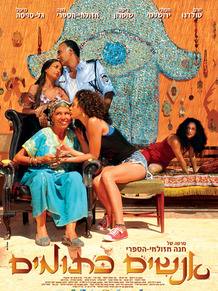Zohara, Mater Familias at the centre of Orange People, has the gift of second sight. She brought it with her to Israel from Morocco many years ago, the ability to divine a person’s hopes and fears at a touch from an intimate possession. But she has burdens of her own, ghosts from the past that refuse to leave her in peace.
Orange People (Anashim Ketumim), written and directed by Hanna Azoulay Hasfari, is a heartfelt if perhaps somewhat sentimentalised film. It considers the curious balance between the present and the past, the compromises we must make to keep on living in the present tense. Zohara wants her daughter Simone to perpetuate the family tradition. She doesn’t want to, though. Simone runs a restaurant; it’s ironic though that her cuisine is very much simple fare of the past, leaving her precarious business easy pickings for the flashy new restaurant across the street. Her policeman husband Jacky tries to keep the extended family unit on an even keel, with mixed results; their teenage daughter is intrigued by her grandmother, but classes her visions a curious occurrence of narcolepsy. Might it run in the family? Good question.
But the uneasy balance falls away when Simone’s sister Fanny sweeps in unannounced. She had vanished without trace 16 years before. She was in Paris, it seems, but why she went – and why she has returned – remains a mystery. The answers, it seems, are tucked away in the dynamics of family relationships; held – perhaps unknowingly – by the three generations of the so-called “orange people”.
Orange People has the feel of an intensely personal project. The veteran actress Hanna Azoulay Hasfari injects a certain anthropological charm into the film. Its paced is unforced, leisurely, and has the sensibilities of a document as much concerned with producing an accurate portrait of inter-generational strain than storytelling per se. Food is central to the narrative, such as it is. Zohara’s rich Cous-Cous – which Simone never manages to emulate – punctuates the first half of the film, and later Fanny’s attempts to win back her sister by revamping the restaurant in a more contemporary style define proceedings. Fanny’s “generousity” doesn’t work, of course. Certain truths have to be told before the family can move on.
It does feel that the story-telling pales beside an admittedly intriguing mise-en-scene. Cliché is never very far away, and whilst the conflicted sisters (Hasafri as Fanny, Esty Yerushalmi as Simone) have strong on-screen chemistry, Jacky, the outsider (Yoram Toledano) alternates between bemusement and confusion. If deliberate, it wouldn’t be an entirely misplaced conceit – a nice flip of the patriarchal mode that so often dominates – but he has a pivotal role, and he doesn’t quite negotiate this successfully.
Proceedings do feel predictable; but since the journey to its cinematic conclusion is interesting, this can be forgiven. Anashim Ketumim traverses the spaces between Morocco and Israel succinctly.
Anashim Ketumim (Orange People) (2013)
Written and Directed by Hanna Azoulay Hasfari
Starring Esty Yerushlami, Hanna Azoulay Hasfari, Yoram Toledano, Rita Shukron
90 minutes, Hebrew and Moroccan Arabic w. English subtitles.






